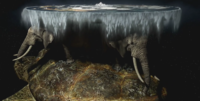Discworld (world)
| Discworld | |
|---|---|

The Discworld as it appears in the SkyOne adaptation of The Colour of Magic
|
|
| Created by | Terry Pratchett |
| First appearance | The Colour of Magic (24 November 1983) |
 |
|
| Publisher | Doubleday |
|---|---|
|
Publication date
|
2008 |
| ISBN | |
The Discworld is the fictional setting for all of Terry Pratchett's Discworld fantasy novels. It consists of a large disc (complete with edge-of-the-world drop-off and consequent waterfall) resting on the backs of four huge elephants which are in turn standing on the back of an enormous turtle, named Great A'Tuin (similar to Chukwa or Akupara from Hindu mythology) as it slowly swims through space. The Disc has been shown to be heavily influenced by magic and, while Pratchett has given it certain similarities to planet Earth, he has also created his own system of physics for it.
Pratchett first explored the idea of a disc-shaped world in the novel Strata (1981).
Great A'Tuin is the Giant Star Turtle (of the fictional species Chelys galactica) who travels through the Discworld universe's space, carrying four giant elephants (named Berilia, Tubul, Great T'Phon, and Jerakeen) who in turn carry the Discworld. The narration has described A'Tuin as "the only turtle ever to feature on the Hertzsprung–Russell diagram."
Great A'Tuin's gender is unknown to the inhabitants of Discworld (though in The Colour of Magic Pratchett describes the turtle as male), but the subject of much speculation by some of the Disc's finest scientific minds. The sex of the World Turtle is pivotal in proving or disproving a number of conflicting theories about the destination of Great A'Tuin's journey through the cosmos. If, as the Discworld version of the popular "big bang theory" states, Great A'Tuin is moving from the Birthplace to the Time of Mating, then at the point of mating the civilizations of the Disc might be crushed, simply slide off, or else the entire world will end. The hypothesis is that all stars in the sky are obviously also worlds carried by giant turtles, and that when all the turtles meet they will mate passionately, for the first and only time; from that mating, it is hypothesized that new turtles would be born to carry a new pattern of worlds. Attempts by telepaths to learn more about Great A'Tuin's intents have not met with much success, mainly because they did not realise that its brain functions are on such a slow timescale. All they've been able to discern is that the Great A'Tuin is looking forward to something.
...
Wikipedia
